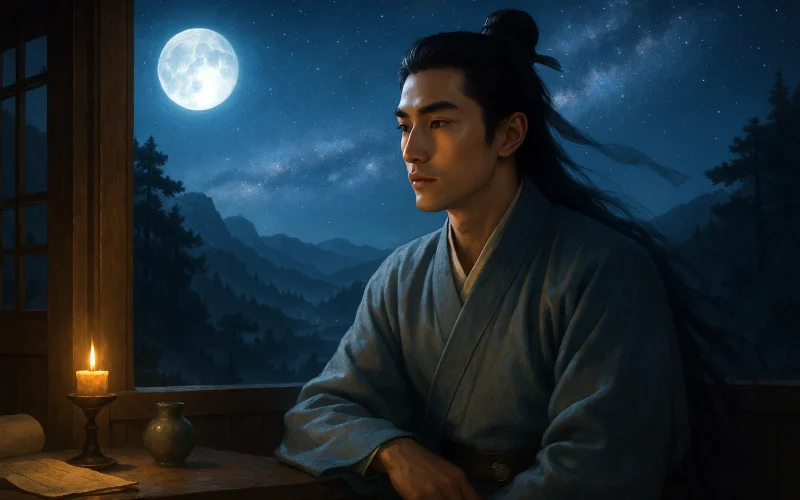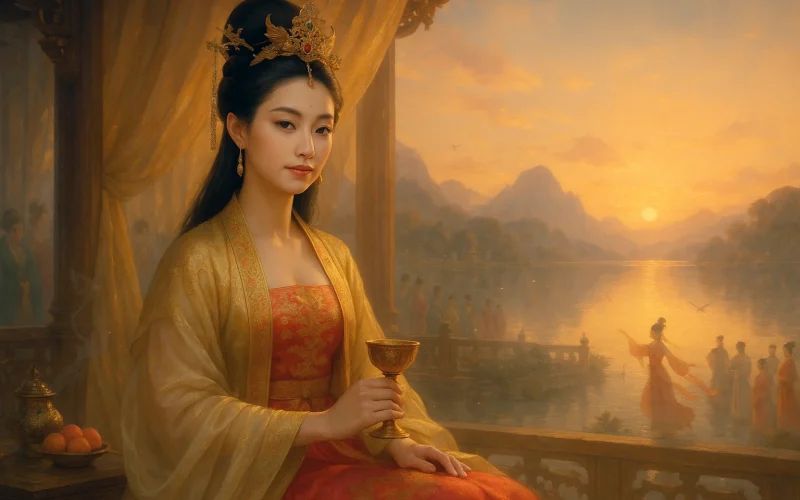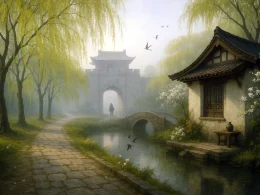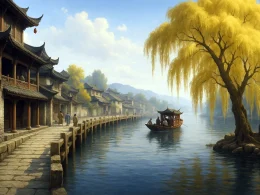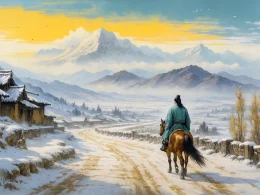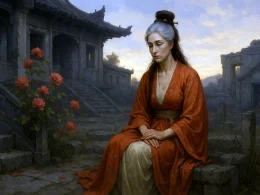Alone, I roam a thousand miles away;
On the Seven-Path Ridge, high I lie.
The moon at dawn nears my windowsill;
The Weaving Stars low enter by.
The green gingko grows in spring sweet;
All night long I hear the cuckoo’s cry.
A roamer vainly listens in retreat;
The morning cocks crow when night winds die.
Original Poem
「夜宿七盘岭」
沈佺期
独游千里外,高卧七盘西。
晓月临窗近,天河入户低。
芳春平仲绿,清夜子规啼。
浮客空留听,褒城闻曙鸡。
Interpretation
This poem was written by Shen Quanqi during his exile to Huánzhou (present-day northern Vietnam). Implicated in the rebellion of Zhang Yizhi and his brothers, the poet was banished to Lingnan. While passing through Shu (Sichuan), he composed this poem while staying overnight at Seven Plate Ridge. Located southwest of present-day Hanzhong, Shaanxi, this high ridge shrouded in clouds was a crucial pass into Shu. The poem captures the moment after the poet bid farewell to Guanzhong and was about to head south. It combines realistic descriptions of travel hardships with reflections on his exiled state—the isolation of "traveling alone a thousand miles away" and the weariness of "lying high west of Seven Plate Ridge" both convey a sense of loss and self-pity, marking a shift in his later style from ornate to genuine expression.
First Couplet: "独游千里外,高卧七盘西。"
Dú yóu qiān lǐ wài, gāo wò qī pán xī.
Traveling alone a thousand miles away,
Lying high west of Seven Plate Ridge.
This couplet establishes the reason and setting of the "night stay." "Traveling alone" immediately reveals the loneliness and despair of an exile—not a leisurely journey but a forced one. "Lying high" both describes the actual scene of resting on a high mountain and implies a resigned, reclusive stance amid personal misfortune, evoking the典故 of Xie An's "reclining high on East Mountain," carrying complex connotations of transcendence and self-consolation.
Second Couplet: "晓月临窗近,天河入户低。"
Xiǎo yuè lín chuāng jìn, tiān hé rù hù dī.
The dawn moon seems near the window;
The Milky Way hangs low as if entering the door.
This couplet depicts the cold, picturesque scene of the night stay. "Dawn moon" and "Milky Way" are distant celestial images, yet described as "near" and "low," contrasting with the high mountain resting place to emphasize spatial layers and the tranquility of the night. The poet blends celestial phenomena with the human realm, embedding loneliness within grandeur, reflecting his transition from courtly precision to natural lyricism.
Third Couplet: "芳春平仲绿,清夜子规啼。"
Fāng chūn píng zhòng lǜ, qīng yè zǐ guī tí.
In fragrant spring, the ginkgo trees turn green;
In the clear night, the cuckoo cries.
"Ginkgo trees green" alludes to mid-spring, using fresh greenery to convey seasonal beauty; "cuckoo cries" shift from scene to emotion, symbolizing sorrowful homesickness. This couplet employs dynamic-static contrast and sensory juxtaposition to portray the spring night atmosphere—lush greenery coexists with mournful cries, creating a mood of light and shadow. Exiled far away, the poet hears the cuckoo and longs for home, turning tranquility into sorrow, embedding grief within the scenery.
Fourth Couplet: "浮客空留听,褒城闻曙鸡。"
Fú kè kōng liú tīng, Bāo chéng wén shǔ jī.
A wanderer listens in vain to the cuckoo's cry;
At dawn, he hears the rooster crow from Baocheng.
The final couplet culminates and resolves the emotion. "Wanderer" is the poet's self-reference, implying rootless drifting. "Listens in vain" expresses helplessness—though homesick, he cannot return. "Hears the rooster crow from Baocheng" uses the distant morning rooster to signal daybreak and the journey's continuation, amplifying the pain of leaving home. The poem naturally transitions from night to dawn, stillness to movement, ending with boundless desolation.
Holistic Appreciation
This poem takes "lodging overnight in the mountains" as its central theme, unfolding through layered descriptions of time, space, sound, and mental state. The opening lines "wandering alone" and "sleeping high" establish themes of transience and solitude; the subsequent couplet depicting the moon and Milky Way reveals the clear light and tranquility of a mountain night; the third couplet, through spring scenery and the cuckoo's cry, conveys melancholy thoughts; and the concluding lines with "wandering traveler" and "dawn cockcrow" subtly imply a sense of having no return. The poetic flow remains coherent throughout, with strict tonal patterns and exquisite parallelism that never feels constrained, making it a model of regulated verse from the early Tang Dynasty.
Though not a single line explicitly mentions "exile," each verse carries hidden sorrow—truly embodying the principle of "expressing emotion through scenery, with inexhaustible subtlety." Lodging overnight in the mountains, originally a brief respite during travel, is transformed by the poet into a symbol of life's rootless wanderings—as if standing at the watershed of life, he gazes back toward the Central Plains with reluctant attachment and helplessness, listening to mountain birds and dawn cockcrows while feeling his existence as transient as floating clouds.
Artistic Merits
- Precise Parallelism and Strict Form: The entire poem uses antithesis with balanced structure, marking the maturity of the five-character regulated verse.
- Emotion-Scene Blending, Expressing Sorrow Through Imagery: Celestial River, cuckoo, and dawn rooster reflect the poet's mood, with emotion embedded in the scenery.
- Rhythm from Stillness to Movement: The quiet moon, mournful cuckoo, and crowing rooster progressively intensify the emotion, creating a complete structure.
- Subtle Depth: Without directly stating the hardships of exile, the natural descriptions everywhere reveal wandering and melancholy.
- Transitional Work: Shifting from the ornate diction of occasional poetry to genuine emotional expression, it represents a key point in Shen Quanqi's stylistic evolution.
Insights
This is not merely a travel poem but a song of personal fate. It teaches us: if one can still contemplate nature and perceive the sounds of all things amid adversity, suffering can transform into reflection, and exile into poetry. Shen Quanqi wrote this elegant work while exiled—both an outpouring of solitary sorrow and a redemption of the soul. The images of "traveling alone," "cuckoo," and "dawn rooster" remind us that life's disappointments are not the end; only by maintaining sensitivity and creativity in hardship can life become art, turning solitude into an eternal song.
About the Poet
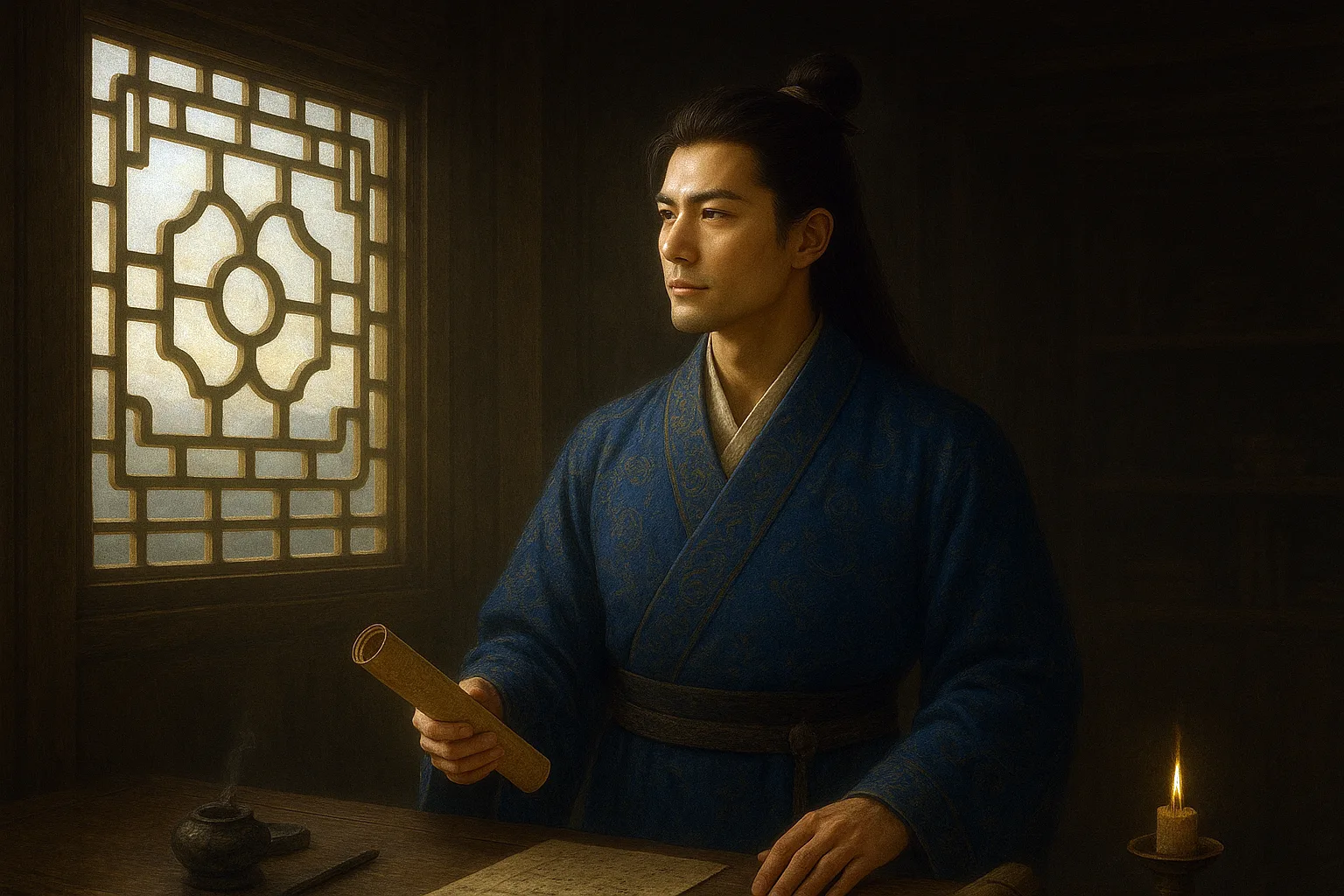
Shen Quanqi (沈佺期 c. 656–715), courtesy name Yunqing, was a native of Neihuang in Henan Province and an important poet of the early Tang Dynasty. Along with Song Zhiwen, he was renowned as one of the "Shen-Song" duo, whose work played a decisive role in finalizing the form of the five-character regulated verse (wuyan lüshi) in Tang poetry. His poems often include courtly compositions and travel-themed reflections, characterized by refined elegance and structural rigor. Shen was particularly skilled in the seven-character regulated verse (qilü), and his writing marks a transition from the lingering style of the Six Dynasties to the flourishing era of High Tang poetry. His contributions hold milestone significance in the development of modern-style verse (jintishi).






